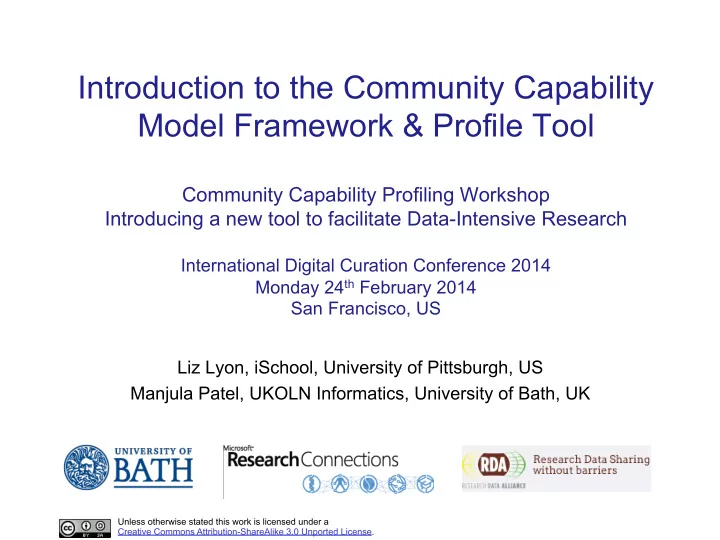

Introduction to the Community Capability Model Framework & Profile Tool Community Capability Profiling Workshop Introducing a new tool to facilitate Data-Intensive Research International Digital Curation Conference 2014 Monday 24 th February 2014 San Francisco, US Liz Lyon, iSchool, University of Pittsburgh, US Manjula Patel, UKOLN Informatics, University of Bath, UK A centre of expertise in digital information management Unless otherwise stated this work is licensed under a Creative Commons Attribution-ShareAlike 3.0 Unported License.
Workshop Goals Ø To demonstrate application of the CCMF Profile tool across a range of contexts and communities: disciplines, organisations, groups etc. Ø To collect completed profiles from participants in a diverse range of disciplines and sub-disciplines Ø To investigate opportunities to customise the Profile for particular domains A centre of expertise in digital information management
Context Ø Experimental Science Observational description of natural phenomena Ø Theoretical Science Use of models and equations e.g. Newton’s Laws Ø Computational Science Digital simulation of complex phenomena Ø Data-Intensive Science Unify experiment, theory and simulation - Jim Gray Ø Data-Intensive Research Intensive data collection and processing Large quantities of data Combination of individual datasets A centre of expertise in digital information management research.microsoft.com/en-us/collaboration/fourthparadigm/ research.microsoft.com/en-us/collaboration/fourthparadigm/
Motivations for DIR Ø Funding Bodies (e.g. NSF, European Union, UK Research Councils, Trusts, Learned Societies, Companies, Foundations) Derive maximum research, economic and social benefits from investments Improve the quality and efficiency of research (robust and reproducible) Increase knowledge transfer within discipline; across disciplines; between sectors Build sub-disciplinary, disciplinary and inter-disciplinary communities Develop added-value services based on corpora of research data Ø Institutions (e.g. HEIs, Facilities (e.g. CERN, STFC, EMBL)) Improve the quality and efficiency of research (robust and reproducible) Increase ability to attract research funds Build institutional and cross-institutional communities Develop added-value services based on corpora of research data Include data citation into research evaluation systems e.g. UK’s REF Ø Researchers (Principal Investigators) Opportunities for new and innovative research Improve the quality of research (robust and reproducible) Improve citations and reputation Career advancement Add data citation into research evaluation systems e.g. UK’s REF A centre of expertise in digital information management
Data-Intensive Research Lifecycle Research Data Management A centre of expertise in digital information management
Areas that need particular attention Ø Legal, ethical and commercial issues – IPR, privacy, sensitivity, licensing Ø Gaining informed consent for reuse and repurposing Ø Appraisal and quality control – Collection and acquisition policies, peer review Ø Trustworthiness – Metadata, documentation, context, provenance Ø Scale and complexity of data – Workflows, methodologies, software, OAIS Representation Information Ø Publication and sharing – Release policy, controlled access, indexing, interoperability (syntax and semantics), cross-searching, federation Ø Citation, attribution and accreditation in scholarly communications – granularity, versioning, persistent identifiers A centre of expertise in digital information management
The CCMF Ø The Community Capability Model Framework (CCMF) Profiling current readiness or capability of a community for DIR Indicating priority areas for change and investment Developing roadmaps for achieving a target state of readiness CCMF White Paper, April 2012 Ø Developed through consultation: case studies and workshops Ø Primarily a tool for self-assessment Ø Categorised into Environmental, Human and Technical elements with eight factors: Openness Legal, Ethical & Commercial Collaboration Economic & Business Skills & Training Common Practices Research Culture Technical Infrastructure communitymodel.sharepoint.com Ø Each factor has characteristics A centre of expertise in digital information management associated with it
CCMF Profile Tool Ø Based on CCMF Ø Implemented as an MS Excel spread sheet Ø Separate worksheets for each of the eight CCMF factors Ø A scorecard tool (5 levels or dimensions for each characteristic within each factor ) A centre of expertise in digital information management
CCMF Profile Tool Worksheets A centre of expertise in digital information management
Group Work Ø Work with colleagues in similar or associated domains Ø Complete the Profile for your chosen domain Ø Review the Profile and make recommendations for enhancements in your domain e.g. semantics, exemplars Ø Discuss results in feedback session Ø Download CCMF Profile tool: people.bath.ac.uk/lismp/CCMF/CCMF-Profile.xlsx A centre of expertise in digital information management
Acknowledgements This work is funded by Microsoft Research Connections. UKOLN Informatics receives additional support from the University of Bath where it is based. Contacts: Liz Lyon: elyon@pitt.edu Kenji Takeda: kenjitak@microsoft.com Manjula Patel: m.patel@ukoln.ac.uk Further Information: http://communitymodel.sharepoint.com/ A centre of expertise in digital information management
Additional Slides A centre of expertise in digital information management
Data Profile A centre of expertise in digital information management
Collaboration A centre of expertise in digital information management
Skills & Training A centre of expertise in digital information management
Openness A centre of expertise in digital information management
Technical Infrastructure A centre of expertise in digital information management
Common Practices A centre of expertise in digital information management
Economic & Business Models A centre of expertise in digital information management
Legal, Ethical & Commercial A centre of expertise in digital information management
Research Culture A centre of expertise in digital information management
Recommend
More recommend